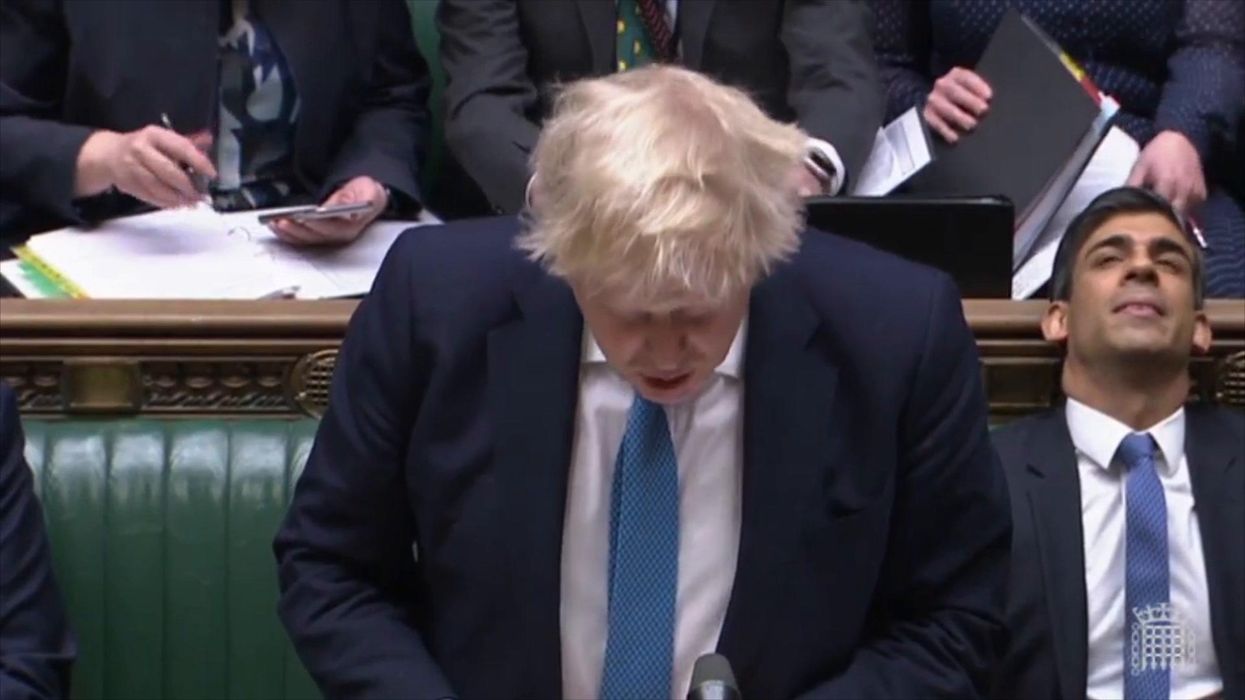When Russia sent troops into Ukrainian regions on a "peacekeeping mission" that Western countries believe is a pretext for war, the global political terrain underwent another seismic shift.
The UK, US and other countries rushed to impose sanctions on Russia for its actions and the whole world waited anxiously to see what would happen next.
So when Boris Johnson and Keir Starmer met after a short parliamentary recess for PMQs today it was clear that there was going to be one major agenda point.
Sign up to our free Indy100 weekly newsletter
Would they agree to strategies to push Russia back or was it a standard bickering match?
Here's what happened:
Johnson: "We squeeze him simultaneously in London, in Paris, in New York... unity is absolutely vital" 9/10
Firstly, in its response to Russia, Johnson pointed out that it is important that Britain does not act unilaterally and stays in step with other Western countries like the US and France. Fair point and Britain has matched the actions of its allies.
Johnson: "There's still hope that he will see sense", 6/10
But he then seemed a bit too relaxed - but is that surprising?
Part of Johnson's appeal is his optimistic tigerish outlook on politics. On countless occasions from Brexit to the coronavirus pandemic, where others wring hands, Johnson sees hope - or at least says he does.
On this occasion, it seems his optimism may be misplaced though.
Johnson: "We live in a democracy and we live in a country that believes in free speech" 5/10,
Starmer then questioned whether Russian state media outlet Russia Today should be allowed to operate in Britain, Johnson let him know that culture secretary Nadine Dorries had taken a break from sniping at the BBC and had got Ofcom to review its license. But he picked on him for his judgement and said politicians should not get involved in the decision.
"That's what Russia does!" he barked.
While press freedom is important, was - in a way - likening Starmer to Putin in his view helpful while developing a united front against Russia? Not at all!
Starmer calls for Ofcom review into Russia Today and Johnson - the man waging war against the BBC and Channel 4 and literally criminalising protest - declares that we\u2019re a democracy with free speech where those decisions shouldn\u2019t be left to politicians #PMQs— Jonathan Lis (@Jonathan Lis) 1645619095
Starmer: "I'm not going to be deflected from the unity that this house needs" 9/10
Thank goodness then, Starmer stopped the tone from plunging into the ground completely when he made this dignified response: "The largest single donation to the Labour Party came from a member of the Chinese communist party."
Next, the Labour leader called on Johnson to look at Labour amendments to an elections bill which he said will stop "the flood of foreign money drowning our politics". Johnson wasn't happy with this light scrutiny and defended his "tough laws to stop foreign donations" before making a jibe about former shadow minister Barry Gardiner accepting more than £500,000 in donations from Christine Lee before he was warned she was a Chinese agent.
Again, Starmer refused to take the bait. "We have to stand united. I am not going to be deflected," he said.
If he had taken the bait though, he may have pointed out that the Conservatives have received £1.93m in Russian donations since July 2019 and a large proportion of that has come from Lubov Chernukhin, the wife of a former Russian deputy finance minister.
Indeed, Chernukhin is the largest female donor in British political history, having donated £2 million to the Conservatives from 2012 to 2020.
Just a thought.
\u201cWe do not raise money from Russian oligarchs,\u201d says Boris Johnson. \n\nOne of the Conservative Party's biggest donors is Lubov Chernukhin, whose wealth comes from her husband Vladimir, who was secretly funded by a Russian oligarch with close ties to Putin. #pmqspic.twitter.com/MyQzyFclsX— Adam Bienkov (@Adam Bienkov) 1645619235
Johnson: "We should stand united", 8/10
As it was important to see the leader of the opposition call for unity in Britain's response, it was important to see the prime minister agree to a collegiate response to escalating tension - even though a few of his interventions seemed rather confrontational.
Verdict:
This edition of PMQs was pretty sedate. Used to flexing their Punch and Judy muscles, the two leaders occasionally seemed het up and reliant on old habits and Johnson made a few unnecessary jibes, but overall the pair succeeded in having a measured debate, admitting issues they disagreed upon and backing each other up on points of consensus.
It was not the pantomime performance that makes good viewing for those at home, but it was the measured debate that makes good governance in a time of crisis - and what is more important?
Have your say in our news democracy. Click the upvote icon at the top of the page to help raise this article through the indy100 rankings.














